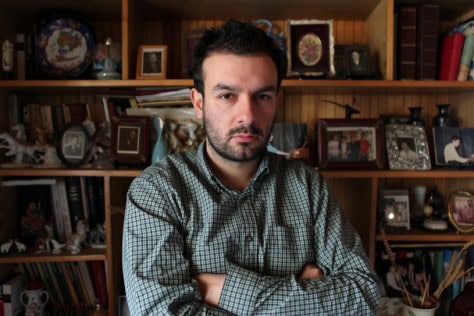After ten high-strung days in the chilly German capital, the 58th Berlin International Film Festival wrapped up last Sunday. One of Europe’s three oldest and most important film events, the Berlinale is famous for being highly political, and it also attracts a much larger viewing public than Venice or Cannes. This year’s lineup brought many big stars to Berlin–Julia Roberts, Penelope Cruz, Scarlett Johansson—and the festival director opted for a rock ‘n’ roll theme that attracted the Rolling Stones, Madonna, Neil Young and Patti Smith.
The only obvious favorite in competition was Paul Thomas Anderson’s breathtaking There Will Be Blood, which was seen here in its international premiere. The international festival jury, headed this year by the French director Costa-Gavras, for the most part resisted the obvious choices and preferred to share the wealth.
Blood only received the laurel for Best Director and a special award for the film’s composer, Radiohead’s Johnny Greenwood. The jury’s other choices seemed tentative and haphazard. Best screenplay honors went to the minor Chinese melodrama In Love We Trust, about an estranged couple brought back together after their daughter is diagnosed with leukemia. The Golden Bear for best picture went to the Brazilian political thriller The Elite Squad, a film that sharply divided critics.
On the other hand, it seemed perfectly forgivable that the jury passed up Daniel Day Lewis (who will in all probability take home an Oscar in any case) and honored instead the Iranian actor Reja Najie for Majid Majidi’s film Song of a Sparrow. And I was most pleased to see best actress go to Sally Hawkins, for her breakthrough performance in Mike Leigh’s utterly delightful Happy Go Lucky, one of the best films in a festival with little that was genuinely new to offer.
In accepting the Best Director award, Mr. Anderson dealt festival director Dieter Kosslick a backhanded compliment: “Dieter runs the Berlinale like it’s a party in his living room.” Indeed, this year’s edition often felt like some garishly marketed Eurotrash party overstuffed with Hollywood celebrities and rock ‘n’ rollers.
Some additional, strong works exhibited in competition were Israeli filmmaker Amos Kolleck’s Restless, about an Israeli hustler who becomes a nightclub bard, and Hong Sangsoo’s leisurely-paced Parisian drama Night and Day.
The other film that left a forceful impression was Polish master Andrzej Wajda’s Katyn, about the 1940 massacre of Polish military officers and intelligentsia at the hands of NKDW operatives, a Soviet crime that was blamed on the Germans for nearly 50 years. While the film leaps back and forth through time rather confusingly, watching this beautifully acted, shot and edited film, it was clear that one was in the presence of cinema greatness. The fact that it was showing out-of-competition seemed criminal itself.
Many of the festival’s near-hits dealt with children either imperiled or grieving, including the Italian drama Quiet Chaos which was perhaps a bit too quiet for its own good. The kidnapping caper Julia featured an impassioned performance by Tilda Swinton, but was chock-full of clichés, and featured a cartoonishly grizzly third act. The two French selections, I’ve Loved You So Long and Lady Jane, were well acted but felt like made-for-TV dramas. Elegy, Isabel Croixet’s ponderous adaptation of Philip Roth’s 2002 novel The Dying Animal, featured fine performances from Ben Kingsley and Penélope Cruz, but had the glamorous yet sterile feel of a Vanity Fair photo-spread.
By far the greatest disappointment in the competition was Errol Morris’ much-awaited Standard Operating Procedure, the first-ever documentary screened in competition in the Berlinale’s 58 years. The film looks at the Abu Ghraib prison abuse scandal. Featuring interviews with many of the prison guards involved, the film lingers fetishistically on the crimes, without adding much to the public record. The film works best as an essay on the ontology of the photographic image and fails near-completely as a compelling, insightful and political documentary. Morris’ slow-motion reenactments and Danny Elfman’s ominous score add a horror-film quality. Despite Morris’ expertise as a documentarian, this remains an angry film that’s incapable of articulating its outrage.
In the non-competitive “Panorama” category, the worst of Korean cinema was represented by Jaihong Juhn’s offensive and vapid Beautiful, about a beautiful woman who tries to escape from her perfect body after she is raped by a deranged admirer. Far better was a world premiere from the Israeli director Amos Gitai, Plus Tard Tu Comprendras, about a family’s buried secrets of Vichy France. The film features a solid performance from Jeanne Moreau, but ultimately falls into the made-for-TV category along with the two French competition selections.
The strongest documentary in “Panorama” was Derek, about the independent British enfant terrible auteur Derek Jarman. Directed by Isaac Julien and featuring Jarman’s favorite leading lady, Tilda Swinton, it is a poetic, perhaps too fawning look at the neglected master’s life and work. Best of all is that it features tons of footage from Jarman’s rare Super 8 films, many of which remain –despite their beauty and originality – totally unavailable.
A documentary of a very different stripe, Guy Maddin’s remarkable and unique My Winnipeg, opened the non-competitive “Forum” category. A hallucinogenic free-form documentary about the Canadian director’s snowed-up hometown, My Winnipeg unfolds as a montage-like series of reflections, revelations and dreams. Incandescent images swirl around Maddin’s head like the snowflakes that fall across the screen. Like much that the Canadian auteur has done, this new film is both tongue-and-cheek and sincere.
Dreamy, low-budget tricks and manipulations are deployed in a very different way in Michel Gondry’s quirky comedy Be Kind Rewind, which closed the festival out of competition, and opens in the US on February 22nd. The film stars Jack Black and Mos Def as video store employees who find themselves in hot water when the entire VHS stock suddenly gets erased. Their solution is to go out and remake every film in the catalogue, using nothing but a camcorder. The resulting no-budget spoofs make up the heart of a film, which for all its silliness manages to reaffirm the power of cinema to bring people together. It was a message that badly needed to be heard in such an uneven and overly glamorized festival. Let’s hope that it resounds through next year’s selection, and throughout Berlin’s majestic film palaces.
 Q&A with Larry Gus
Q&A with Larry Gus We Own the Night: The Edison
We Own the Night: The Edison
No Comments